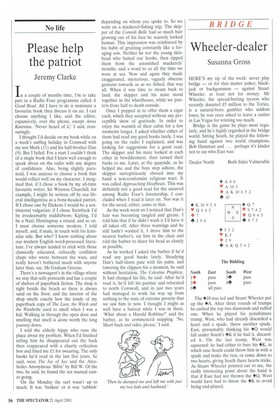Please help the patriot
Jeremy Clarke
In a couple of months time, I'm to take part in a Radio Four programme called A Good Read. All I have to do is nominate a favourite book then discuss it on air. I can choose anything I like, said the editor, expansively, over the phone, except Anna Karenina. 'Never heard of it,' I said, reassuringly.
I thought I'd decide on my book while on a week's surfing holiday in Cornwall with my son Mark (11) and his half-brother Dan (9). But I failed. For a start I couldn't think of a single book that I knew well enough to speak about on the radio with any degree of confidence. Also, being slightly paranoid, I was anxious to choose a book that would reflect well on my character. I imagined that, if I chose a book by my all-time favourite writer, Sir Winston Churchill, for example, I might be written off by our liberal intelligentsia as a bone-headed patriot. If! chose one by Dickens I would be a sentimental vulgarian; if I chose Steinbeck I'd be irredeemably middlebrow; Kipling, I'd be a Nazi; Hemingway a retard, and so on. I must choose someone modern, I told myself, and, if male, in touch with his feminine side. But who? I know nothing about our modern English word-processed literature. I've always tended to stick with those classically educated, culturally confident chaps who wrote between the wars, and really haven't bothered much with anyone later than, say, Mr Graham Greene.
There's a newsagent's in the village where we stay that sells postcards and has a couple of shelves of paperback fiction. The shop is right beside the beach so there is always sand on the floor, and the interior of the shop smells exactly how the inside of my paperback copy of The Lion, the Witch and the Wardrobe used to smell when I was a kid. Walking in through the open door and smelling that smell is alone worth the long journey down.
I told the elderly hippy who runs the place about my problem. When I'd finished telling him he disappeared out the back then reappeared with a charity collection box and fined me £1 for swearing. The only books he'd read in the last five years, he said, were The Joy of Sex and the Alcoholics Anonymous 'Bible' by Bill W. Of the two, he said, he found the sex manual easier going.
On the Monday the surf wasn't up to much. It was 'broken' or it was 'rubbish'
depending on whom you spoke to. So we went on a mackerel-fishing trip. The skipper of the Cornish Belle had so much hair growing out of his face he scarcely looked human. This impression was reinforced by his habit of grunting constantly like a foraging sow. Neither he nor the young skinhead who baited our hooks, then ripped them from the astonished mackerels' mouths, said a word to us all the time we were at sea. Now and again they made exaggerated, mysterious, vaguely obscene gestures towards us as we fished, that was all. When it was time to steam back to land, the skipper and his mate stood together in the wheelhouse, while we punters froze half to death outside.
Once I popped in to offer them a cigar each, which they accepted without any perceptible show of gratitude. In order to enjoy the warmth of their cabin for a few moments longer, I asked whether either of them had read any good books lately. I was going on the radio I explained, and was looking for suggestions for a good read. The skipper and his mate looked at each other in bewilderment, then turned their backs to me. Later, at the quayside, as he helped me and the boys step ashore, the skipper surreptitiously shoved into my hand a non-conformist religious tract. It was called Approaching Hoofbeats. This was definitely not a good read for the unsaved among Radio Four's listenership, I concluded when I read it later on. Nor was it for the saved, either, come to that.
As the week went on I noticed that Dan's hair was becoming tangled and greasy. I told him that if he didn't wash it I'd have it all taken off. After three warnings and he still hadn't washed it, I drove him to the nearest barber's, sat him in the chair and told the barber to shave his head as closely as possible.
As he worked I asked the barber if he'd read any good books lately. Steadying Dan's half-shorn pate with his palm, and lowering the clippers for a moment, he said without hesitation, The Celestine Prophesy. It had changed his life, he said. After he'd read it, he'd left his partner and relocated to north Cornwall, and in just two years had managed to work his way up from nothing to the state of extreme poverty that we saw him in now. I thought I might as well have a haircut while I was in there. 'What about a Harold Robbins?' said the barber, as he commenced snipping. 'No. Short back and sides, please,' I said.


































































 Previous page
Previous page